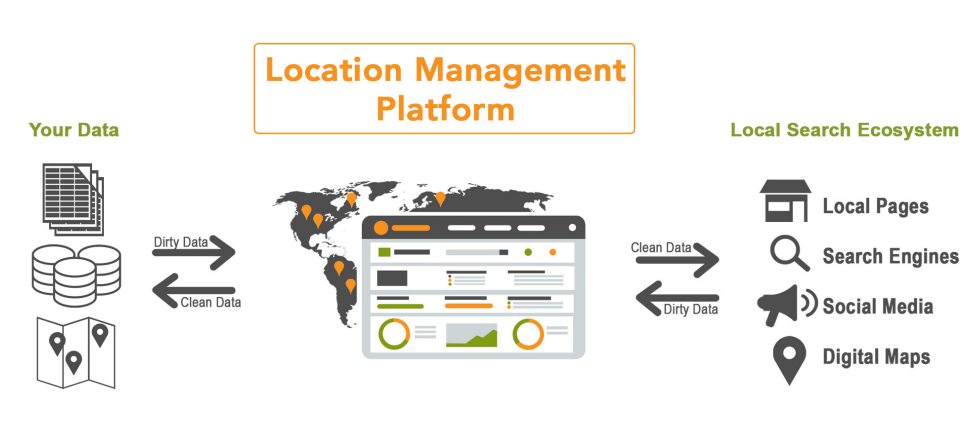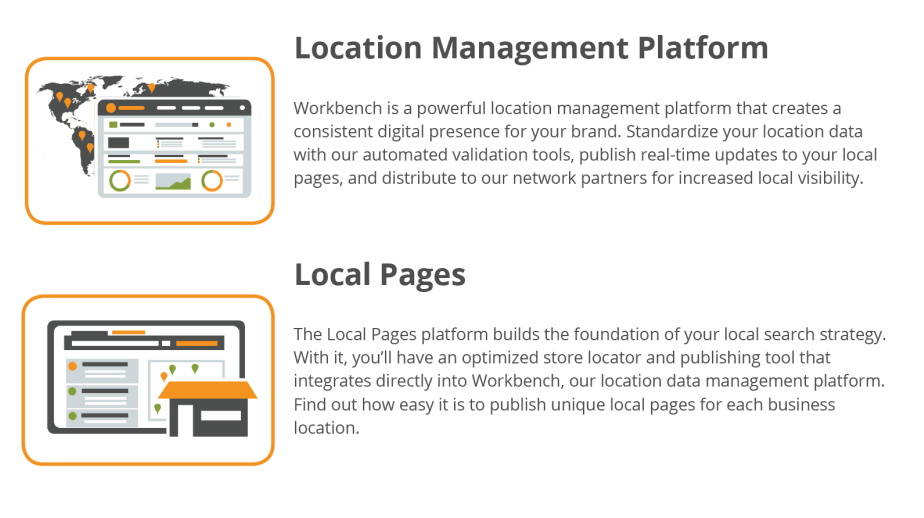Troubleshooting Introduction
How do the main components of the product work together?
-
-
- Placeable solutions enable enterprise brands to drive online and offline revenue through location data management, local marketing, and digital advertising.
- Placeable solutions enable enterprise brands to drive online and offline revenue through location data management, local marketing, and digital advertising.
-
-
-
-
- Search: Provide “Local Pages Locator” for website (e.g. find retail store locations near my zip)
-
-
-
-
-
- Syndication: Push location data (address, operating hours, etc.) to 3rd parties (e.g. Google Maps), and monitor syndicated quality.
-
-
-
-
-
- Data quality: Correct location data (e.g. bad zip code, address info, map pins)
-
-
Placeable Solution Components:
- Placable SFTP Server: This is used by customers to send us location data feeds as CSV files.
- ETL Data load Platform: A proprietary Data Load platform used to process location data files using ETL (Extract Transform Load) processes/jobs where the data is derived from a predefined schema in Customer CSV files ingested from the SFTP and transformed in the required format to be inserted into Database tables.
- Oracle RDBMS database: Used as an intermediate data store before the data is inserted into the final Pages and Workbench MongoDB datastores.
- Google & Bing Geocoder Components: Used to convert address information from location data received from customers into GeoCoordinates that are used all over the platform for Mapping Purposes. The resultant geocode information is used in Map pins on the Pages Locator as well as External Mapping sites to which it is syndicated (e.g. Google Maps & Apple maps)
- Pages Locator Component: A customized “Site Locator” web page matching look-and-feel of the customer website. The customer’s corporate website usually has a link titled “Find/Search Locations” which leads to their Pages location search landing page that is hosted on our SaaS infrastructure. It has a location search UI with proximity search logic (to find nearest locations by geographical search parameters).
- Workbench Platform: This is mostly used by the BU MSO/Local Solutions PS Team to correct location information and publish it to third-party sites by means of syndication that uses APIs and Dashboards. Placeable Solution Components:
Data Model and Storage:
|
Data type |
Data model and storage |
|
Workbench location data |
Documents, MongoDB |
|
Workbench reporting data |
Relational, Redshift |
|
Workbench audit data |
Documents, Elasticsearch 1.7 |
|
SICM geo-indexed location data |
Documents, Elasticsearch 1.1 |
|
SICM location details data |
Documents, MongoDB 2.x |
|
ETL Data loads internal location data |
Relational, Oracle |
|
Bing Geocoder fix rules |
Documents, MongoDB 2.x |
|
Bing Geocoder cache |
Documents, Elasticsearch 1.1 |
|
Google Geocoder cache |
Documents, Redis |
What are the most common scenarios where troubleshooting is required?
- Outages
- Location Data Accuracy issues
- Location search issues
- Map Pin inaccuracy issues
What are the most difficult types of issues to troubleshoot?
- Specific Location or Service updates not available on Locator
- Data Load failure
- Mobile Apps showing inconsistent data
In what cases would L1 agents need to do troubleshooting?
- Pages Locator Outage
- Workbench Outage
- Basic Troubleshooting when location not appearing in search results
Resources
What logs do we need to use while troubleshooting and where are they located?
- SFTP Logs can be requested from SaaS Ops.
-
The logs that we have access to are ETL Data Processing Logs.
- These can be found by: Clicking on any of the last 10 data jobs that have run in the ETL UI as documented in the Running an ETL Process via Job Scheduler article (Steps 4 & 5).
Where can we find additional documentation?
-
-
- Links to the repository for the source code.
-
-
-
-
- Workbench API Store: https://github.com/trilogy-group/ignite-placeable-workbench-api-store
-
-
-
-
-
- Workbench Audit Service: https://github.com/trilogy-group/ignite-placeable-workbench-audit-service
-
-
-
-
-
- Workbench Client SocketIO: https://github.com/trilogy-group/ignite-placeable-workbench-client-socketio
-
-
-
-
-
- Workbench Data: https://github.com/trilogy-group/ignite-placeable-workbench-data
-
-
-
-
-
- Workbench Mapping: https://github.com/trilogy-group/ignite-placeable-workbench-mapping
-
-
-
-
-
- Workbench Redshift - Export: https://github.com/trilogy-group/ignite-placeable-workbench-redshift-export
-
-
-
-
-
- Workbench Reporting: https://github.com/trilogy-group/ignite-placeable-workbench-reporting
-
-
-
-
-
- Workbench Rules: https://github.com/trilogy-group/ignite-placeable-workbench-rules
-
-
-
-
-
- Workbench Scheduling: https://github.com/trilogy-group/ignite-placeable-workbench-scheduling
-
-
-
-
-
-
-
-
Google Geocoder: https://github.com/trilogy-group/ignite-placeable-geocoder-google
-
Google Geocoder: https://github.com/trilogy-group/ignite-placeable-geocoder-google
-
-
- Link to any other architecture/developer docs (APIs, database, microservices, etc.)
-
-



Priyanka Bhotika
Comments